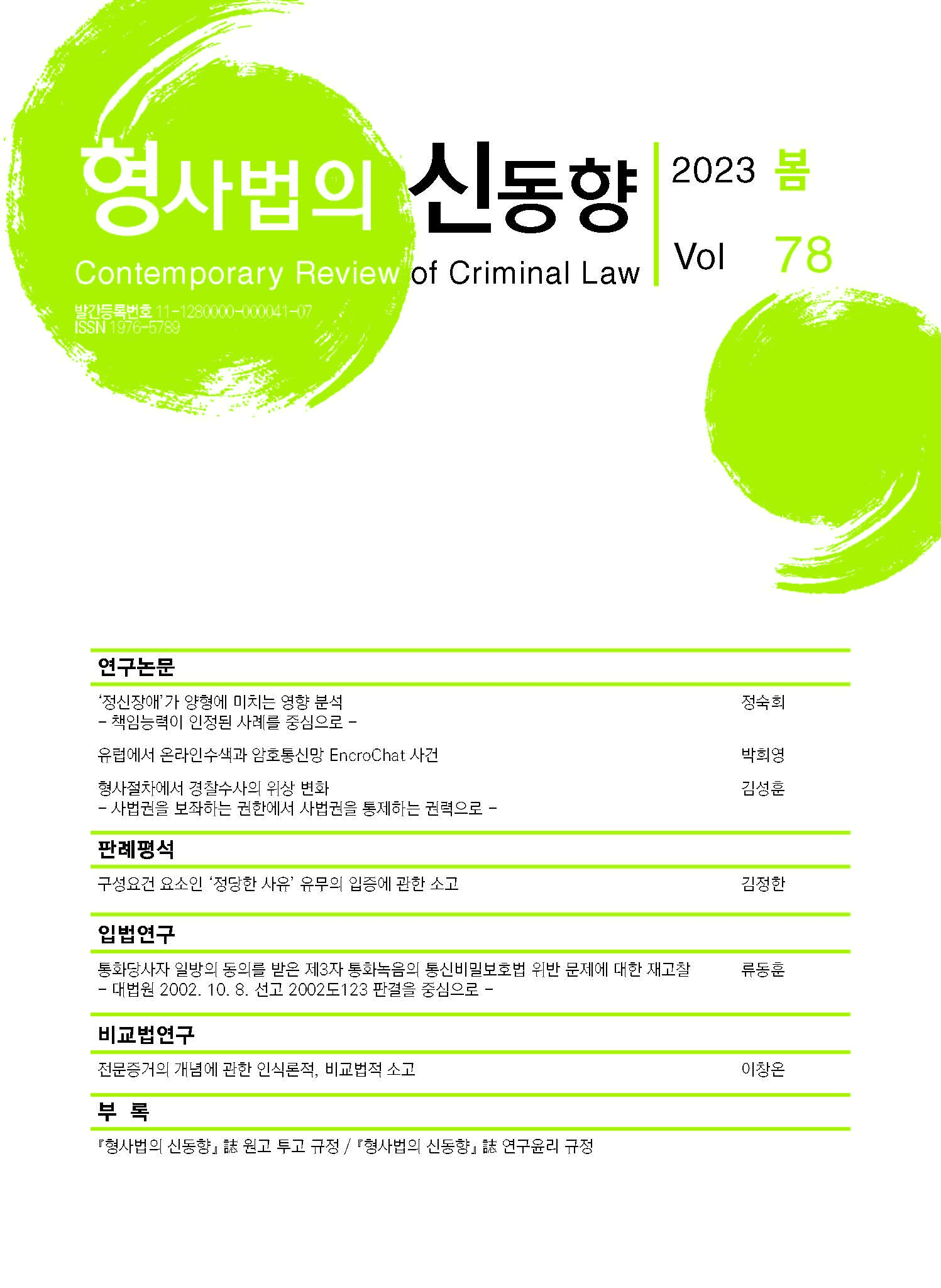학술논문
구성요건 요소인 ʻ정당한 사유ʼ 유무의 입증에 관한 소고
이용수 38
- 영문명
- A study on the proof of a ʻjust causeʼ, which is an element of the establishment of a crime
- 발행기관
- 대검찰청
- 저자명
- 김정한(Kim Jeong Han)
- 간행물 정보
- 『형사법의 신동향』제78호, 107~135쪽, 전체 29쪽
- 주제분류
- 법학 > 법학
- 파일형태
- 발행일자
- 2023.03.31
무료
구매일시로부터 72시간 이내에 다운로드 가능합니다.
이 학술논문 정보는 (주)교보문고와 각 발행기관 사이에 저작물 이용 계약이 체결된 것으로, 교보문고를 통해 제공되고 있습니다.

국문 초록
병역법 제88조 제1항은 “현역입영 또는 소집 통지서(모집에 의한 입영 통지서를 포함한다)를 받은 사람이 정당한 사유 없이 입영일이나 소집일부터 다음 각 호의 기간이지나도 입영하지 아니하거나 소집에 응하지 아니한 경우에는 3년 이하의 징역에 처한다(이하 생략)”이라고 규정하고 있다. 대법원은 위 정당한 사유를 구성요건 요소라고평가하면서도 그 입증에 대하여는 피고인에게 구체적인 소명자료 제시를 요구하고 검사가 그 신빙성을 탄핵하는 방법으로 정당한 사유의 부존재를 입증할 수 있다고 판시하였다. 그러나 이는 구성요건 해당성이 입증되면 위법성과 책임은 사실상 추정되므로피고인이 반증을 제시한 경우에만 검사에게 본증 책임이 발동한다는 통설의 논리의틀을 그대로 정당한 사유 입증에 적용한 것에 불과하다. 소극적 사실을 입증하는 것이쉬운 일은 아니지만 통설과 같이 입증책임을 피고인에게 전가하는 논리를 법적 근거도 없이 해석론에 의해 도출할 수는 없다. 더욱이 판례의 논리대로 가면 소명과 반증의차이에서 알 수 있듯이 구성요건 해당성 입증이 위법성 입증보다 더 쉬워지는 기이한결과가 발생하고 만다.
필자는 위법성과 책임과 관련하여서도 피고인에게는 이를 조각시키는 구체적 사유를 주장하여 쟁점을 형성할 책임만 부여할 뿐 반증을 제시할 책임을 부여하여서는 아니되므로, 구성요건 요소인 정당한 사유와 관련하여서는 더더욱 피고인에게는 구체적 사유를 주장하여 쟁점을 형성할 책임만 부여할 뿐 소명자료를 제시할 책임을 부여하여서는 아니된다고 생각한다. 더 나아가 정당한 사유 없음이 위법성 조각사유가 아닌구성요건 배제사유라는 점을 고려하면 피고인의 주장만 기다릴 것이 아니라 피고인에게 소집에 불응한 특별한 이유가 있었는지 등을 적극적으로 물어 정당한 사유 유무의주장 기회를 실질적으로 보장할 필요가 있다. 입증대상이 소극적 사실인 경우 검사에게 주는 입증상의 배려는 입증책임이 현실화되는 상황과 입증하여야 할 범위의 한정이지 입증 방법에서의 특혜나 입증 정도의 완화가 아니라는 점을 강조하고 싶다.
영문 초록
Article 88 Paragraph 1 of the Military Service Act states, “If a person who has received a notice of enlistment in a military unit or a call-up (including a notice of enlistment by recruitment) fails to enlist or respo nd to the call-up even after the period of each of the following subpar agraphs has elapsed since the date of enlistment or call-up without jus tifiable reasons shall be punished by imprisonment for not more than th ree years (hereinafter omitted)”. The Supreme Court judged the above just cause as an element in the establishment of a crime, but ruled that the absence of a just cause could be proven by requiring the defendant to present concrete explanatory materials and impeaching the credibility of the case. However, this is almost the same as the proof of just caus e, which is the element of crime, based on the conventional logic that t he original burden of proof is invoked on the prosecutor only when the defendant presents evidence to the contrary, since illegality and respon sibility are in fact presumed if only the elements constituting the crime are satisfied. It was applied by analogy. It is not easy to prove negativ e facts, but the logic of shifting the burden of proof to the accused, lik e the majority theory, cannot be derived by interpretation theory witho ut legal grounds. Moreover, following the logic of the precedent, as can be seen from the difference between vocation and proof of opposition, a bizarre result occurs in which it is easier to prove that the requireme nts for criminal establishment are met than to prove illegality.
Regarding illegality and responsibility, I only give the defendant the r esponsibility to form an issue by insisting on specific reasons to fragm ent it, but not to give the responsibility to prove the opposite. Moreov er, I think that the responsibility for presenting explanatory materials s hould not be given to the defendant, only the responsibility to form an issue by claiming specific reasons. Furthermore, considering that the ab sence of justifiable grounds is not a ground for illegality but a ground f or excluding the requirements for establishing a crime, the defendant s hould not only wait for the defendant's argument, but actively ask the defendant whether there was a special reason for not complying with t he call, etc. need to be practically guaranteed. I would like to emphasiz e that, when the subject of proof is a passive fact, the consideration gi ven to the prosecutor is limited to the situation in which the burden of proof is realized and the scope to be proved, not preferential treatment in the method of proof or mitigation of the degree of proof.
목차
Ⅰ. 들어가며
Ⅱ. 정당한 사유의 범죄성립요건에서의 지위
1. 정당한 사유가 구성요건 요소인지 위법성
요소인지
2. 구별의 의미와 효과
Ⅲ. 정당한 사유 유무의 입증
1. 입증책임 분배
2. 쟁점형성 책임
3. 소명에 대한 일반적 검토
4. 대상판결이 말하는 소명자료 제시의 의미
Ⅳ. 나가며
※ 참고문헌
키워드
해당간행물 수록 논문
참고문헌
교보eBook 첫 방문을 환영 합니다!

신규가입 혜택 지급이 완료 되었습니다.
바로 사용 가능한 교보e캐시 1,000원 (유효기간 7일)
지금 바로 교보eBook의 다양한 콘텐츠를 이용해 보세요!




